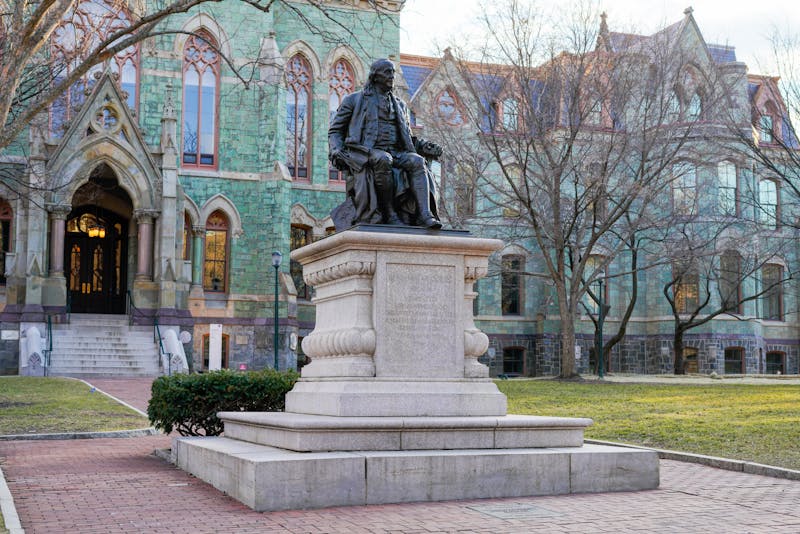
One hundred and sixteen years after his arrival at Penn, W.E.B. Du Bois’ contributions and accomplishments have been recognized by the University.
At Friday’s stated meeting of the Board of Trustees, Du Bois was posthumously bestowed with an honorary emeritus professorship in the departments of Sociology and Africana Studies.
Du Bois first came to Penn in 1896 as an assistant lecturer who studied Philadelphia’s Seventh Ward, a neighborhood that was predominantly populated by African Americans.
Three years after leaving Penn, Du Bois had already written two of his major works, An American Dilemma: The Negro Problem and Modern Democracy and The Philadelphia Negro: A Social Study.
Despite his contributions to the Penn community, however, Du Bois was never offered a professorial appointment during his time at the University.
As an African American during a time of racial conflict, Du Bois “would not have even been considered that intelligent” to be awarded a professorship, explained Sociology Department Chair Tukufu Zuberi.
Looking back, Zuberi — who initially made the recommendation for Du Bois’ posthumous professorship at Penn — and other faculty believe that Du Bois should have been recognized long ago while teaching at the University.
“The reason I did this was because it has not been done,” Zuberi said. “It is 116 years later and it must be done.”
Patricia Williams, dean of the W.E.B. Du Bois College House, applauded Zuberi’s efforts.
“Racism was the only reason Du Bois did not get the degree, and I’m especially pleased that the Penn community of professors and administrators — black and white and of all races, creeds and colors — have come together to right the wrong that was done to Du Bois,” she said.
A surprise visitor also made a special guest appearance at Friday’s Board of Trustees meeting.
Du Bois’ great-grandson, Arthur McFarlane, spoke briefly after Du Bois was given the professorship.
“You can’t duplicate history … you always move forward with it,” he said, challenging Penn to continue its ongoing work with the Action Plan for Faculty Diversity and Excellence.
Alongside his appointment on Friday, the Penn community also held a day-long conference to honor Du Bois’ intellectual contributions.
As part of the conference, more than 20 scholars from across the nation presented new research in several fields of study, including Sociology and Africana Studies.
Lewis Gordon, a professor at Temple University who presented a lecture at the conference, said “there is nothing in Africana Studies that does not owe a debt to W.E.B. Du Bois.”
College junior Justyn Williams, a member of UMOJA — Penn’s umbrella organization for black student groups — agreed.
“It’s really a shame that people didn’t want to honor him [earlier] because they didn’t want to see themselves as receiving knowledge from a black person. The fact that the university is taking steps now, even though it’s a little bit after the fact, is an enormous step,” he said. “Du Bois has been a great leader, a figurehead for the African Americans and a scholar who made contributions to the community at large.”
In addition to his role as one of the founders of the National Association for the Advancement of Colored People, Du Bois is also recognized as the father of the pan-African Movement.
According to Zuberi, DuBois was one of the pioneering and towering intellectuals of the 19th and 20th centuries, as he achieved the highest levels of sociological science.
For College junior Seck Barry, Du Bois was one of the most prestigious figures who has ever taught at Penn.
Berry believes that Du Bois’ recognition as an official professor is a great achievement, serving as an inspiration for other black professors at Penn.
Williams agreed.
“Du Bois has earned this and it’s wonderful to know that we’re part of a university that is committed to rectifying the injustices that have been done,” she said.
“He was able to rise above the absurd limitations of his time,” Zuberi added. “He dreamed of a world where equality and justice ruled the day. With this appointment, Penn honors his vision at a time when it attempts to address his concerns.”
The Daily Pennsylvanian is an independent, student-run newspaper. Please consider making a donation to support the coverage that shapes the University. Your generosity ensures a future of strong journalism at Penn.
DonatePlease note All comments are eligible for publication in The Daily Pennsylvanian.







